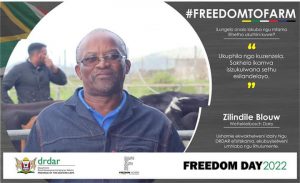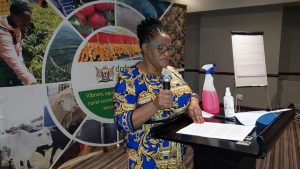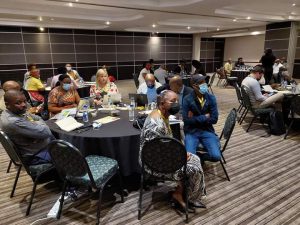
by Olwetu Batyi | May 12, 2022 | Uncategorized

Abantu abaninzi abantsundu eMzantsi Afrika bohluthelwa umhlaba wabo ngooRhulumente bengcinezelo. Umzabalazo wenkululeko ubuquka ukubuyiselwa komhlaba kubantu bawo, nokuqinisekisa ukuba abantu bayawufumana umhlaba ngendlela echazwe kuMgaqo-Siseko welizwe lethu. UZilindile Blouw waseTsitsikama, uRonnie Matshaya wase Matatiele, kunye noSindiswa Mtsila wase Sterkspruit bakuxelela ngelungelo labo lokuvelisa ezolimo. Bonke bafumene uncedo kwiSebe uDRDAR elifake igxalaba kuMashishini abo ezolimo.


#FreedomToFarm #FreedomDay22 #FreedomMonth

by Olwetu Batyi | Apr 7, 2022 | Uncategorized

DRDAR MEC vows to ensure efficient services
MEC for Rural Development and Agrarian Reform (DRDAR) Nonkqubela Pieters has vowed that no money will be left unspent as the Department works towards delivering excellent services to the people of the province.
The MEC was addressing stakeholders including farmers, commodity groups during a Post Policy Speech Stakeholder Engagement held after the tabling of the policy speech.
“I want to ensure you that all the pronouncements will be implemented. We are going to ensure that with every cent spent there’s an impact in terms of economic growth and employment. We will do what we said we will do,” she said.

MEC Pieters said the engagement was meant to debate robustly, be able to identify areas where a great work was performed and where things were not do well. She said It was the responsibility of all stakeholders to come up with clear recommendations on how to improve in areas where the department did not do well.
Head of Department Siphokazi Ndudane said: “I’d like to stress our commitment to continue to move with speed and achieve our plans. Agriculture is in the centre of rural wealth and economic development. We need to transform rural growth and employment and ensure that people have access to food.”
Ndudane vowed to end corruption and self-empowerment by ensuring resources of government are used for the benefit of the people.
“We’ve been hearing about the potential we have as the province but we need to graduate from that by using that potential to change the lives of the people, said Ndudane.
Speaking on behalf of workers, trade unionist Thembakazi Xoxo said officials will continue to serve the people to the best of their ability.
“We’ll be consistent and serve with excellence,” she added.
Some of the issues raised by the farmers included access to land and funding, frequent engagement with DRDAR management, research, training, infrastructure development and need for an Indaba.
MEC Pieters said the issues raised by farmers did not need “brilliant responses but farmers need implementation and that what we will do.”
She said she would convene an Indaba that would also include potential investors.
by Olwetu Batyi | Mar 2, 2022 | Uncategorized
Varsity student uses monthly allowance to start agri business
A young Dutywa animal science student from the University of Fort Hare has used his monthly R1, 500 student aid allowance to start an agriculture business in his home town. Nkosinathi Makamela launched his venture in 2020 at the height of the Covid-19 pandemic when the country was still on a hard lockdown, and has already established a market for his business.
With plans to become a commercial farmer in the next five years if all goes well, Makamela has established a piggery and vegetable farm on 3ha of land in his rural vill age. Here he plants cabbage, carrots, beetroot, green peppers and spinach, which he sells to fruit and vegetable stores in Dutywa and neighbouring towns.
He said all he needed was an investment from the public and private sector to realise his dream of being a commercial farmer. The department of rural development and agrarian reform has played its part by supplying Makamela with seedlings.
“The company will greatly enhance the well-being of the community at large through the provision of nutritious food, creation of jobs and education and training. As we plan to provide learnerships and training programmes for the youth,” he said.
Makamela, who also owns a hawkers’ stand in Dutywa’s central business district where he sells vegetables, aims to increase bulk supply to shops and individuals who buy in bulk, such as street venders. The 22-year-old farmer describes himself as a team player and a focused and hardworking individual who pays very serious attention to his work.

by Olwetu Batyi | Mar 2, 2022 | Uncategorized

Deciduous fruit farmers anticipate better yields
Deciduous fruit farmers in the Sarah Baartman District who have had to endure souring fortunes as a result of natural disasters in the past three financial years are anticipating a much-needed turnaround.
After suffering a prolonged drought since 2015, their situation worsened when a severe hailstorm ravaged their orchards of apples, pears and plums in 2021, destroying 80% of the fruits just before harvesting season. Misgund Landgoed just outside Joubertina is one of the farms hit hard by the punishing weather, leading to a decline in the farm’s yield that fluctuated just between 2,000 and 3,000 tonnes from its 69 hectares of orchards.
The farm grows different kinds of apples, namely Flash Gala, Royal Gala, Top Red, Grannysmith and Golden Delicious, as well as plums and Forelle pears. Misgund Landgoed is owned by a 134-member trust and it is among the many enterprises to have received support from the Eastern Cape provincial department of Rural Development and Agrarian Reform ( DRDAR ) .
“Government extended muchneeded support to the farm,” said Jan Uithaler, deputy chairperson of the board of trustees. “When we struggled with water during the severe drought in the region, the department helped us with a proper irrigation system — some – thing which saw our production growing exponentially.
DRDAR further supported the farm with a tractor and a 1,500 litre boom sprayer,” Uithaler said all the help they received propelled them even further but they suffered severely after the hailstorm. However, they expect their yield from the February harvest to go beyond 3,000 tonnes.
“Our fruit is in perfect condition. We ’ve had enough water. There we re n’t gusting winds that usually blow our fruit off the trees and at times causing them bruises when they thrust on either the stems or bump on each other.
“This year’s yield is definitely going to make a huge difference to our bottom line and help us to service our debts.” Wilfred Malgas, who manages JD Rovon farm which also grows deciduous fruit, projects an increase on their bottom line of just more than R 5 – million.
“The farm has always relied on government grants and other forms of aid but if what we see on our orchards can be a constant trend for at least 10 years, we’d certainly be a sustainable business and be able to pay everything from our own pocket s,” Malgas said.
DRDAR provided the farm fertilisers, a tractor, irrigation system and pesticides and scooped the farm’s dam, its only water source for irrigation. It also subsidised the business with 4,000 litres of fuel per year.
A large portion of the two farms’ produce is exported to international markets like Angola, China, the US and Britain. The business employs more than 200 workers from neighbouring communities with most of the labour force being seasonal workers during the harvesting season.

by Olwetu Batyi | Mar 1, 2022 | Uncategorized

Godongwana’s budget restores hope for vulnerable households
National Treasury has tabled a basket of proposals aimed at supporting poor and vulnerable households, while staying on course to restore the health of the public p u r se. This comes at the back of tax collections over the past 12 months exceeding expectations due to the strength of the mining sector revenue, and an upturn in earnings following the 2020 recession.
“The 2022 Budget extends government’s support to poor and vulnerable South Africans, while staying on course to restore the health of the public finances. This approach is supported by economic reforms to bolster investment, growth and employment,” said Treasury.
The department said the budget responds to the immediate needs of low-income households by providing short-term assistance. However, Treasury cautioned that uprooting poverty and inequality requires a thorough restructuring of the economy, and creating an environment in which the private sector can invest and create jobs.
“Despite an uneven economic recovery, tax collections over the past 12 months have outperformed expectations due to the strength of mining sector revenue and an upturn in earnings following the 2020 recession.
“Some of this improved performance is projected to continue over the medium term. “Government is using a portion of the additional revenue to accelerate debt stabilisation, with the majority targeted to address urgent social needs, promote job creation through the presidential employment initiative, and support the public health sector.
” Spending expected to grow over the medium-term National Treasury said over the next three years, consolidated government spending was expected to grow at an annual average of 3.2%, from R2.08-trillion in 2021- 22 to R2.28-trillion in 2024-25.
“Most non-interest spending is directed to the social wage, which includes health, education, housing, social protection, employment programmes and local amenities. An amount of R18.4bn is allocated in 2022-23 and 2023-24 to support youth employment and the creation of short-term jobs under the presidential employment initiative, Treasury said.
“Government’s steadfast commitment to returning public finances to a sustainable position means that it will achieve a primary surplus – where revenue is higher than non-interest spending – by 2023-24, one year earlier than anticipated at the time of the 2021 MTBP S.
“This will bring the period of fiscal consolidation to a close, creating space to reconsider the funding of South Africa’s priorities in a fiscally











